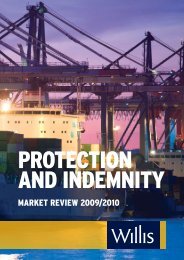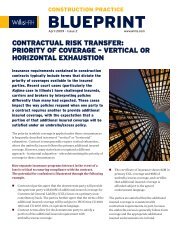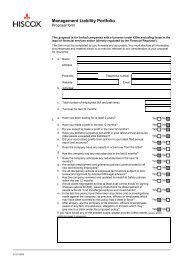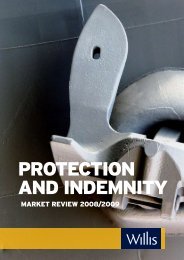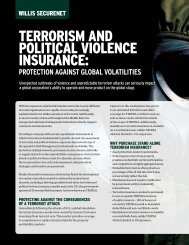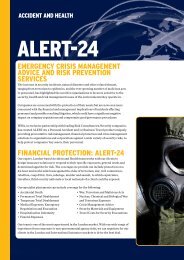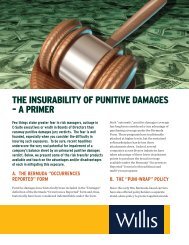spRING 2011 GlobAl MARKETs INTERNATIoNAl - Willis
spRING 2011 GlobAl MARKETs INTERNATIoNAl - Willis
spRING 2011 GlobAl MARKETs INTERNATIoNAl - Willis
Create successful ePaper yourself
Turn your PDF publications into a flip-book with our unique Google optimized e-Paper software.
FoReigN iNvestMeNt<br />
iNvestMeNt CliMate<br />
The type of regulatory and contract uncertainty<br />
faced by Rio Tinto in Sulawesi has dissuaded<br />
more foreign investment in Indonesia’s<br />
Mining sector over the past decade. Added<br />
to that, provisions in the new mining law<br />
seem to favour smaller mining companies,<br />
which could mean less incentive for the major<br />
multinational mining firms to invest further<br />
in the sector. These firms also face financial<br />
constraints given the current global economic<br />
slowdown and its implications for the demand<br />
for commodities and at least one other major<br />
international mining firm has decided to exit<br />
from the Indonesian Mining sector. In June<br />
2009, BHP Billiton announced its decision to<br />
sell its interests in the Maruwai coal project<br />
in Kalimantan. Indonesia’s state-owned or<br />
private mining firms will likely buy the Maruwai<br />
contracts with PT Aneka Tambang and PT<br />
Bumi Resources having expressed an interest in<br />
purchasing them. Other interested parties may<br />
include Indian and Chinese firms. There is a<br />
strong demand for Indonesian coal in India and<br />
China and in 2007 India’s Tata Power Co bought<br />
a 30% stake in both PT Kaltim Prima Coal and<br />
in PT Arumtin at a cost of USD 1.3 billion.<br />
FoReigN CoMPaNies<br />
A number of international mining companies<br />
have operations in Indonesia, including<br />
Freeport McMoran and Rio Tinto. Freeport<br />
operates the Grasberg copper and gold<br />
mine in Papua province with a 67% share of<br />
a joint venture including Rio Tinto (13%),<br />
the Indonesian government (9%) and an<br />
Indonesian firm, PT Indocopper Investama<br />
(9%). Rio Tinto is also planning a USD 1 billion<br />
nickel mine in Sulawesi jointly with PT Aneka<br />
Tambang, a project which until February 2010<br />
had experienced delays owing to differences<br />
between the central and local governments over<br />
the awarding of mining rights for the mine.<br />
key Risks<br />
(i) Contract Review and Contract Certainty:<br />
Overlapping jurisdictions of local and central government<br />
over mining operations creates contract uncertainty as does<br />
the lack of clarity over the transition to the new mining law;<br />
coal producers face uncertainty as regulations over domestic<br />
market obligations are yet to be finalised.<br />
The re-election of President Yudhoyono to his second, and final,<br />
five-year term in July 2009 has some positive implications for contract<br />
certainty in the Mining sector. While certain leaders, in particular<br />
former Vice President Jusuf Kalla, have indicated a desire for greater<br />
national control over Indonesia’s mineral wealth, Yudhoyono<br />
has maintained a pro-investor stance and his re-election signals<br />
that the central government will be comparatively less ready to<br />
interfere with and renegotiate mining contracts. However, there are<br />
two sources of ambiguity in mining regulations: the regional autonomy<br />
or decentralisation framework introduced in 2001 and the transition to<br />
the new mining law passed in 2008.<br />
" IndonesIa Has aBout 5.5 BIllIon<br />
tonnes of reserVes of Coal. tHe<br />
Country also Has sIgnIfICant<br />
reserVes of CoPPer, gold, BauxIte,<br />
nICkel, sIlVer and tIn"<br />
<strong>Willis</strong> | Mining Market Review <strong>2011</strong> | 69



